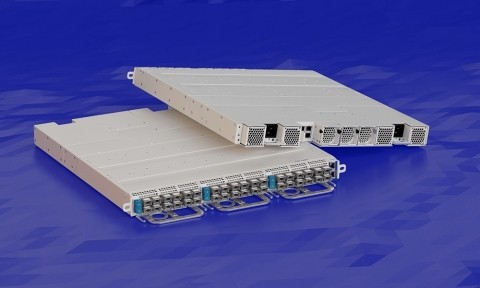CSC – IT Center for Science, which operates the Finnish University and Research Network (FUNET), has transported 400Gbit/s over its existing long-haul network using the ADVA FSP 3000 TeraFlex™. The trials pave the way for ultra-fast access to Finland’s supercomputers and could offer a major boost to Europe’s research and education community. They also demonstrated the terminal’s ability to carry 1200Gbit/s channels for the transport of 3x 400GbE over a live meshed ROADM infrastructure. What’s more, the trials highlighted how TeraFlex™ maximizes spectral efficiency in any open line system. Using the terminal’s ultra-flexible modulation and adaptive baud rate capabilities, FUNET also achieved new levels of bandwidth efficiency – and therefore could significantly reduce opex – for 400GbE, 100GbE and lower-speed services.
“These trials demonstrate how the ADVA FSP 3000 TeraFlex™ performs over long-haul distances, and the results were well above our expectations. It was the first time when we really needed a gridless line system to enable a full choice of line speeds and modulations. The powerful performance of TeraFlex™ and its flexibility to tune line speed and modulation, will allow us to optimize spectrum usage and minimize the cost of providing services to our users,” said Jani Myyry, FUNET network, CSC – IT Center for Science. “Our network provides essential connectivity for research and education institutes in Finland and throughout the Nordics. Initially we were aiming for transport based on 100Gbit/s and 200Gbit/s but are now seeing an increasing need for speeds above that, up to use cases requiring a bandwidth of multiple Tbit/s. TeraFlex and our ADVA open line system infrastructure enable us to efficiently scale our network with line speeds of 400Gbit/s and above. The trials show how TeraFlex™ dramatically increases flexibility and efficiency for 100GbE and 400GbE transport over long-haul distances.”
FUNET’s tests underline the ability of the ADVA FSP 3000 TeraFlex™ to massively increase the capacity of existing terrestrial long-haul networks. The low-power 1RU terminal enables channels of up to 1200Gbit/s for 3x 400GbE services and a total capacity of 3.6Tbit/s. Using network telemetry, software-defined fractional QAM modulation and adaptive baud rate capabilities, the solution is able to ensure maximum spectral efficiency at every point in the network. This enables operators to leverage previously unused optical spectrum so that deployed infrastructure can be made to transport far more data. As well as succeeding with 600Gbit/s transport over 278km and with 400Gbit/s over 2,844km, the trials showed the power of harnessing granular increments with speeds of 300Gbit/s over 4,681km.
“These tests show how it’s now possible to optimize all optical paths over any reach. They demonstrate to the research and education industry that there’s a new way for long-distance networks to support soaring data demand. With its ultra-flexible modulation, our compact and open FSP 3000 TeraFlex™ is the key to unlocking maximum value in any network,” commented Henning Hinderthür, VP, product line management, ADVA. “Together with the CSC – IT Center for Science, we’ve shown how deployed infrastructure operating with coherent channels can transport traffic at unprecedented speeds. And not only that. Our unique TeraFlex™ solution also enhances performance, improves port efficiency and delivers major opex savings. It massively increases the efficiency of existing 100GbE connectivity, while also providing a way to meet the needs of emerging data-hungry applications for 400GbE and beyond.”




